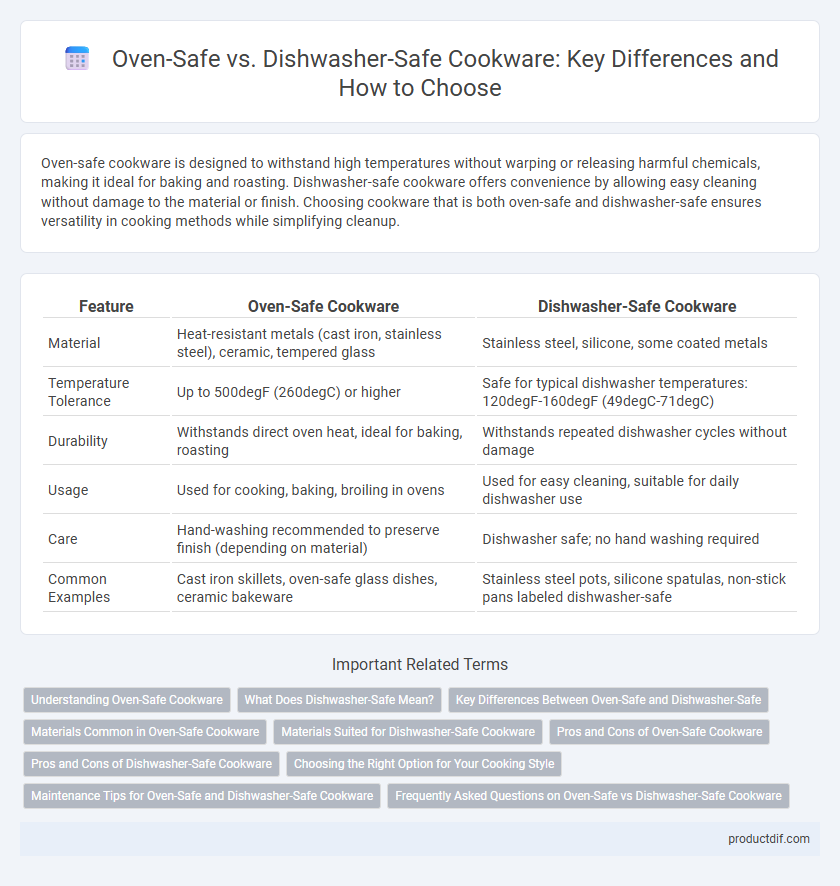Oven-safe cookware is designed to withstand high temperatures without warping or releasing harmful chemicals, making it ideal for baking and roasting. Dishwasher-safe cookware offers convenience by allowing easy cleaning without damage to the material or finish. Choosing cookware that is both oven-safe and dishwasher-safe ensures versatility in cooking methods while simplifying cleanup.
Table of Comparison
| Feature | Oven-Safe Cookware | Dishwasher-Safe Cookware |
|---|---|---|
| Material | Heat-resistant metals (cast iron, stainless steel), ceramic, tempered glass | Stainless steel, silicone, some coated metals |
| Temperature Tolerance | Up to 500degF (260degC) or higher | Safe for typical dishwasher temperatures: 120degF-160degF (49degC-71degC) |
| Durability | Withstands direct oven heat, ideal for baking, roasting | Withstands repeated dishwasher cycles without damage |
| Usage | Used for cooking, baking, broiling in ovens | Used for easy cleaning, suitable for daily dishwasher use |
| Care | Hand-washing recommended to preserve finish (depending on material) | Dishwasher safe; no hand washing required |
| Common Examples | Cast iron skillets, oven-safe glass dishes, ceramic bakeware | Stainless steel pots, silicone spatulas, non-stick pans labeled dishwasher-safe |
Understanding Oven-Safe Cookware
Oven-safe cookware is designed to withstand high temperatures without warping, melting, or releasing harmful chemicals, typically made from materials like cast iron, stainless steel, and certain types of glass or ceramic. Unlike dishwasher-safe cookware, oven-safe items can endure direct heat exposure, making them suitable for roasting, baking, and broiling. Proper identification of oven-safe symbols or manufacturer guidelines ensures safety and longevity when cooking at elevated temperatures.
What Does Dishwasher-Safe Mean?
Dishwasher-safe cookware is designed to withstand high temperatures and strong detergents used in dishwashers without damage or degradation. This means materials like stainless steel, certain ceramics, and heat-resistant non-stick coatings maintain their integrity and functionality after repeated machine cleaning. Knowing whether cookware is dishwasher-safe ensures longevity, convenience, and hygiene in kitchen maintenance.
Key Differences Between Oven-Safe and Dishwasher-Safe
Oven-safe cookware is designed to withstand high temperatures without warping, melting, or releasing harmful chemicals, making it suitable for baking, roasting, and broiling. Dishwasher-safe cookware is constructed to resist corrosion, color fading, and damage from harsh detergents and high-pressure water jets during cleaning cycles. The key difference is that oven-safe items prioritize thermal resistance, while dishwasher-safe items emphasize durability against cleaning processes.
Materials Common in Oven-Safe Cookware
Oven-safe cookware is commonly made from materials such as cast iron, stainless steel, and heavy-duty ceramics that can withstand high temperatures without warping or releasing harmful substances. In contrast, dishwasher-safe cookware often includes non-stick coatings or plastic components that may degrade with heat exposure, making them unsuitable for ovens. Understanding the material composition is crucial to ensure durability and safety when using cookware across different appliances.
Materials Suited for Dishwasher-Safe Cookware
Stainless steel and hard-anodized aluminum are top materials suited for dishwasher-safe cookware due to their durability and resistance to corrosion. Silicone and tempered glass components also withstand dishwasher cycles without warping or discoloration, maintaining longevity. Non-stick coatings must be verified as dishwasher-safe to prevent surface deterioration during cleaning.
Pros and Cons of Oven-Safe Cookware
Oven-safe cookware offers the advantage of versatility, allowing seamless transition from stovetop to oven, ideal for recipes requiring browning and slow cooking without transferring food to another dish. However, these materials often have limitations on maximum heat tolerance and may suffer damage or discoloration if heated beyond recommended temperatures. Unlike dishwasher-safe options, oven-safe cookware frequently demands hand washing to preserve its finish and longevity, potentially increasing maintenance time.
Pros and Cons of Dishwasher-Safe Cookware
Dishwasher-safe cookware offers the convenience of effortless cleaning and time savings, reducing manual scrubbing and maintaining hygiene by effectively removing food residues. However, frequent dishwasher use can cause certain materials like non-stick coatings or wooden handles to degrade faster, diminishing the cookware's lifespan and appearance. Choosing dishwasher-safe options balances ease of maintenance with potential wear risks, making it essential to consider specific material durability and manufacturer care guidelines.
Choosing the Right Option for Your Cooking Style
Oven-safe cookware is designed to withstand high temperatures, making it ideal for roasting, baking, and broiling, while dishwasher-safe options offer convenience for easy cleanup without compromising durability. Choosing between oven-safe and dishwasher-safe cookware depends on your cooking style and kitchen habits; oven-safe pieces enhance versatility for heat-intensive recipes, whereas dishwasher-safe items simplify maintenance. Consider materials like cast iron or stainless steel for oven use and non-stick or ceramic-coated pans for dishwasher compatibility to align with your culinary needs.
Maintenance Tips for Oven-Safe and Dishwasher-Safe Cookware
Oven-safe cookware requires careful temperature monitoring to avoid warping and degradation, while dishwasher-safe items benefit from routine cleaning to prevent residue buildup and maintain finish quality. Avoid harsh detergents and high-temperature cycles for both types to extend lifespan and preserve non-stick coatings. Regular inspection for cracks or discoloration ensures safe use and optimal performance in cooking and cleaning environments.
Frequently Asked Questions on Oven-Safe vs Dishwasher-Safe Cookware
Oven-safe cookware is designed to withstand high temperatures without warping or releasing harmful chemicals, typically up to 500degF, while dishwasher-safe cookware can be cleaned in dishwashers without damage to its surface or finish. Common questions include whether ceramic, stainless steel, or nonstick pans are both oven- and dishwasher-safe, with most stainless steel varieties meeting both criteria but some nonstick coatings degrading in dishwashers or at very high oven temperatures. Users often inquire about the longevity of safety features, as frequent dishwasher use can wear down nonstick coatings faster, whereas tempered glass and cast iron require hand washing despite being oven-safe.
Oven-Safe vs Dishwasher-Safe Infographic

 productdif.com
productdif.com